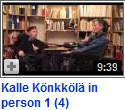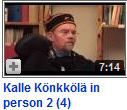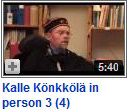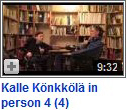Interview with Kalle Könkkölä November 2008
Kalle Könkkölä 1 of 4
Kalle, welcome. You've been doing so much in your life it's hard for me to remember, although I've known you for quite a long time. As far as I recall, and please complement, you've been one of the founders of the Green Party in Finland, you've been a member of the Finnish Parliament for the Green Part , which caused them to reconstruct the building of the Parliament and made you lose your personal assistance because, obviously, a person who's becoming a politician is no longer disabled. How did that affect you?
It happened '83. I got elected from the hospital. If you have a driver's license and are a Member of Parliament, you can no longer be a respirator patient. That's a legal term in Finland, it meant that they cut off all my assistance (upon becoming a MP).
Quite soon they stopped paying me the money, so at first I took a loan from the bank, together with some friends, and hired my own assistance. Maja, my wife, was helping me as well. This happened in April, and in August this arrangement became impossible and I had to move to the hospital. So I went to the Parliament from the local hospital every day. This was quite a nightmare and it's maybe one reason I'm not thinking it should be nice to be in Parliament again because I have such bad experiences from that time. Of course I started a court case about the issue but in the beginning it was very complicated. The first court that took the issue said "It's not my issue, it's an issue between the City of Helsinki and the university hospital", and I didn't participate in court. But then I got some help from my wife's lawyers, and in November I won the case. Since then I've been on the safe side. Sometimes I'm so safe that when I go to some medical treatment, doctors are so afraid of me they won't even touch me! It's sometimes funny, but at that time, it was not funny. I spent four months in the hospital, and during that time work in Parliament was almost impossible, as the hospital had no special treatment for Members of Parliament. I was the last one in the shower queue. When I said "please, can you take me first in the morning, because I have to be in Parliament", they said "no, we have equal treatment for everybody." But in the end, the lady who was doing the actual showering took me first.
As I understand, when you were in Parliament, you traveled with your electric wheelchair and your ventilator all the way from Turku on the Finnish west coast to the capital Helsinki. Why did you do this?
This happened a few years later, but it has a background from my time in Parliament. Back then I made a proposal to Parliament to make all trains accessible, this was in '85-'86, but nothing happened in the Finnish railway. So in the beginning of the 90's, when I was no longer Member of Parliament, we organized a demonstration in Finland where I traveled by my own wheels from Helsinki to Turku, which is about a 170 kilometers distance. The motto of the campaign was "Express train to Turku!". I wanted to demonstrate that there were no accessible trains. If you were a disabled person the only way to travel this route was by your own wheels. The demonstration took three days, but we took it as a big celebration. When we arrived at the Helsinki railway station we had the police orchestra play "Lift the anchors!" and some people marched with me the first ten kilometers. In every place I went there where lot's of people working with me. At the final stop, in Turku, there was a celebration party in the market square.
Now, 15 years later, all the trains between Helsinki and Turku are accessible. This happened this fall. Last year there were still two trains that weren't accessible, and most of the trains, we call them intercity trains, going between the big cities are nowadays accessible. In five years also the local traffic will be accessible. So this is something that has happened in Finland.
But my lesson here is that if you want to influence your own society you have to use different means - sometimes you need to use demonstrations, sometimes you need to use lobbying, and sometimes you need to do all kinds of background work, in fact you always need to use several approaches at the same time - only demonstrations are not enough.
Kalle, you have been chairperson, and now, director of Threshold (the Finnish equivalent to an Independent Living Center). Tell us how it started.
Yes, we started Threshold… Well, I graduated from highschool, or gymnasium as we say, in 1969, and I went to study mathematics at the University of Helsinki. I studied very hard, I wanted to become a mathematician in an insurance company. That was my plan because at that time they got a good salary. Also, math books were physically the lightest books in the whole university to carry, law books where the heaviest. I started studying and I met a few disabled people there. For us the simplest things were complicated, like "where is the lecture, in an accessible or inaccessible room?" It was really difficult. The professors said "I have been lecturing in this room for 20 years, I won't change my room". I wrote an article for the student union newspaper, saying that we need a union for disabled students. So we started this in '72 and got established legally in '73. But of course, the problems at the university are minor problems compared to other problems disabled people have, and had at that time, especially. Very quickly we widened our activities to all kinds of human rights issues. We had some basic ideas which still are very valid, that we're a cross-disability organisation, a human rights organisation, run by disabled people. At that time in Finland, most disability organisations where run by non-disabled people. We’re a non-charitable organisation. We are not giving services, because we are consumers. We're consuming services, at that time there weren't so many. That was our starting point, in 1973, and also the end of my career as a mathematician, because I became politically active and that took all my time.
Kalle Könkkölä 2 of 4
Since then you have expanded your horizon. When did your interests took you outside Finland?
Well, I went, if I remember right, in ’73-74, can’t remember exactly, to a Red Cross youth camp in Norway, for disabled people and non-disabled people. I met Judy Heumann there and some other friends who I still keep in touch with, 35 years later.
This widened my perspective because I saw so many other people from different countries. I decided to take a trip to the US to look around at their universities. I had heard that they had services for disabled people (at the University of Helsinki, there were no such services at all). Basically I was visiting several universities, but also the Berkeley Center for Independent Living, which was very important for me, as I saw that we were not the only ones in the world who did what we were doing. In Finland, we faced a quite hostile environment at that time. Most of the other disability organizations didn't like what we were doing, because they were traditional charitable organizations, and at that time I wasn't a very diplomatic person. I said exactly what I thought, maybe sometimes too directly. But there I got encouragement. I didn't like the way things are in the US, but I like the spirit, the spirit of people doing things by themselves. Strong individuals who can do so many things. That gave me lots of energy, and I also learned Independent Living as a word, and realized what we were doing was the same thing, but we didn't call it Independent Living at that time. Also, I made contact with so many people while I was traveling around, which gave a lot of energy to the whole Threshold organization in Finland, and we expanded our activities, step by step.
I met you for the first time in '83, at a DPI seminar in Turku. This was the beginning of our friendship. How did you get involved with Disabled Peoples' International?
In the 70's, when we were established, I had contact with some people who were with Rehabilitation International. At that time there was no movement of disabled people internationally. However, in Europe there was FIMITIC (International Federation of Persons with Physical Disability, which is not the most progressive organization in the world, a strange organization indeed, where most of the people were not really severely disabled. I learned to know some people from the Finnish Rehabilitation International organization. The first time I visited one of their meetings was '76 in Tel Aviv, Israel, and that was terrible for me. So many rehabilitators around... But at this meeting there were a handful of disabled people who were critical of the organization and we had some gatherings in hotel rooms. Among other who were attending I remember Liam Maguire from Ireland. The next Rehabilitation International conference was held in Winnipeg, Canada in 1980. Me and my wife Maja traveled together. I also met Judy there again. This meeting was very well organized. There was also a Swedish participant, Bengt Lindqvist, a member of the Swedish Parliament at the time, who together with others, tabled the proposal that Rehabilitation International should change their bylaws, so that the majority of the decision makers of the organization – more than 50 per cent - should consist of disabled people. This got written down at the conference in Winnipeg.
This was maybe the best thing this organization ever did, because they didn't accept disabled people in a leading role. Because, as a reaction, the Canadians had organized a caucus for disabled people every day in the meeting. First we became very frustrated, then secondly we decided to establish a world coalition of people with disabilities, which was, of course, a terrible name, and was later changed to Disabled People's International. The next year, 1981, DPI was officially established in Singapore, but the starting point was in Winnipeg. That was also the time when Rehabilitation International was left alone. Most of the disabled people left the organisation at that time. Nowadays, the relationship is much better, now tthat DPI is a grown up organization. But RI is still a quite complicated organization, with too many professionals. But anyways, that's fine for me since we have our own organization now.
Kalle Könkkölä 3 of 4
Since then things have changed, and you became the DPI chairperson. You do a lot of traveling.
I'm becoming old, I don't travel so much, but I did a lot of traveling during the mid 90's, maybe to 70 countries. First I was vice chair of DPI, then chairperson of DPI, and I had the possibility and duty, to travel quite much, and also visit different developing countries. That opened my eyes very much about world disability politics and gave me a perspective about what we should be doing. But international organizations, like DPI, are still very weak. DPI has regional members, and from year to year, one member is weaker than the other, we have never been strong all at the same time. I think that other international organizations, like the World Blind Union, the World Federation of Deaf have the same problem. If you go to their headquarters, you'll only find a few people there. This means that these organisations' capabilities to do work are really limited, because people are there voluntarily, on their free time. The people who are in charge are often overloaded with work. So things are moving only slowly.
Still in the 90's, and early 2000, international organizations didn't work so well together, and that was a problem. Now, the situation has improved, when we have IDA, where the international organizations of disabled people and Rehabilitation International have joined together. This gives some new possibilities. The UN Convention would have never come through without IDA. But still IDA is quite weak, with hardly any staff, and they have the regulation that everybody has to have the same opinion at the same time. Consensus is important, but if one organisation is opposing, then IDA has no decision, and that makes it sometimes weak. We have not really succeeded to work, although we've tried very hard. I have used my own time with the World Bank. There is some progress one day, next day you go backwards. In the UN we don't really have a place. At the time Bengt Lindqvist was a Special Rapporteur something happened, but then after Bengt it has been six silent years, almost nothing has happened. We really don't have much influence in the UN. The same is true for the different regional bodies where the disability movement is so weak.
But I am optimistic, we have possibilities, because we have seen in different countries that if we unite our voices and forces we can influence. The disability community has power, if we can only use it.
Kalle, I've heard that the Nordic countries are trying to promote you as a candidate as the next Special Rapporteur to the UN. What are the chances?
I don't know, it's maybe too strong to say that the Nordic countries have united their forces on this. The weak point is the money, that the Finnish government has not promised to pay that much. The Special Rapporteur’s work is, like everything in the UN concerning disability "extra budgetary". So it's not in the budget of the UN. It means that it runs on voluntary donations from the member states. If they put money into this, then there is something going to happen. It’s the same in the World Bank. There are only disability activities if someone puts money there. This weakens my position. But who knows, I have been in politics, it's a different issue to be a candidate than to be elected. Sometimes you get elected, sometimes not. But it's up to the UN Secretary General. I'm quite sure that the economical situation has some influence, because the Secretary General wants to have a Special Rapporteur who can finance himself or herself.
Kalle Könkkölä 4 of 4
Kalle, on a personal note, I remember a United Nations meeting, an Expert Seminar in Lahti in 1991. I was there and you chaired the meeting. I wrote you a small piece of paper, a message, saying that I'm proud to see a fellow ventilator user on stage, and everybody – just like now - could hear your ventilator through the sound system. That gave me great personal satisfaction.
People looking at us, might think, my god, these poor fellows, they might fall dead any moment. How has that affected your work with, let's say the World Bank or government officials, with people who are not used to seeing disabled people.
That's a difficult question. But on the other hand our disability is a very strong tool, a message, a statement. I think it's so important that we who have the possibilities, that we travel and meet disabled people in different countries. It’s a statement that disabled people can do so many things. When I started to use the respirator - that was in '71 - doctors said "don't use a respirator because you will get dependent on that".I tried to be independent of the respirator, and that was a big mistake in my life because I was feeling bad all the time. But then my wife said "Kalle, you are dependent, don't care about that". I started using the respirator more and didn't listen to the doctors any more, and since then I've felt much better. That was at first a very difficult situation for me. The next step was to use the respirator in public. That was difficult because I thought everybody was staring at me, but the fact is that people don't care. People don't stare because they are so selfish they'll only think about themselves. They don't look at others so much, so you can do whatever you want. I remember once, I was in Ireland and met a British guy who was using a respirator. He said to me "Kalle, how can you use your respirator in public. I find it so difficult when people stare at me". I said "Don't worry, they won't stare more when you use a respirator, because we look different anyway". And that's a fact. It's our problem, an inside-problem of people who are afraid of using a respirator. But it doesn't matter at all. Funny things happen in the world. My biggest achievement in my career was when I was part of the Finnish delegation at the UN and they had to install an extra plug, an electrical outlet, in the UN General Assembly hall, for my respirator.
Then there are other statements we can make. I made a decision when I was elected to Parliament: I will never be carried in, I can only be carried out. Of course I'll go to my friends who don't have accessible houses, but I would never go to a meeting if it's not accessible. This has been my personal decision and I've followed it. In Finland, if the meeting is in a place where I cannot get in, I will not go there however important it might be. These kinds of personal decisions, personal statements have influence. I don't like that so many disabled people don't care, they let themselves be carried everywhere. But if we stay outside we have more to say. We have to be visible, and we have to make a statement.
I remember, the Green Party had a meeting, in eastern Finland, I traveled there by train which took five hours. I was going to speak at the meeting as one of the founders of the organization. But when I came to the front of the meeting place, I saw that it was not accessible. I said "I'm not going in there". All my friends said "Kalle we'll get you in, don't be so difficult". Then I became more angry, I said "The more you push me, the less I come in!". I went to the cafeteria, made a statement and took the next train back to Helsinki. After that, all the meetings have been accessible.
And that's how we have to do it. We have to demonstrate, individually and together. There are certain issues we should never accept. Of course we have to recognize that everything can't always be perfect, but there have to be some limits. I can only speak for myself, as everybody sets their own limits, but personally I become very disappointed every time I see someone who has to be carried.
Kalle, you have achieved, done and tried so many things in your life. Which accomplishment are you most proud of?
There are two things I like very much, they are like my babies. First is the association of Threshold, because it has had so much influence. It's a small organization, 1500 members in Finland, and compared to other organizations who are much richer and have more members we have been very influential. We have been the first in the front to lead the change.
The other thing that's very important for me is the Abilis Foundation. It's a foundation that gives money only to grassroots organizations of disabled people in developing countries. It's practical work, most of the other work is political and advocacy work. I remember when we started Threshold, we didn't have so much money in the beginning. Our first budget was maybe € 10 and it was difficult to get money to activities. It's nice to have the possibility to channel money to grassroots organisations in developing countries, since I know how difficult it is to get this kind of money.
I think in the end, the major problem we are facing is that we're not accepted as full citizens. We're not accepted as a full partner in our own society, we are isolated, discriminated against and also quite often humiliated in our existence. But I'm very optimistic that the more we are involved in our communities, the more we will be accepted, but first we have to accept ourselves, and not be ashamed. I remember when I was ashamed about my disability. I'm sure that quite many other people who were born with their disability have the same experience, "it's terrible, I'm disabled, what's wrong with me". But there's nothing wrong with me! OK, something is wrong but it's not the disability, it's some other weakness we have, like all human beings. But in the end we can live together. That's why it's so important to be against all kinds of institutions, all kinds of special arrangements, special education, segregation etc. The only way to live together is to live together. You cannot study it. And as disabled people we must also learn to live in an environment which is not ready yet. It's not good to wait, the change won't happen if we're just waiting for the world to become perfect.
Kalle, thank you so much for sharing all of this with us.
| Attachment | Size |
|---|---|
| 31.76 KB |





